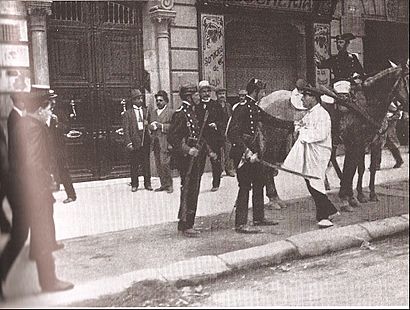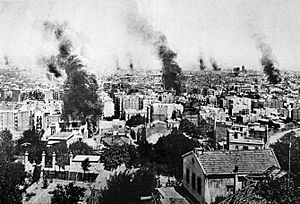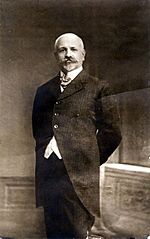Tragic Week (Spain) facts for kids
Quick facts for kids Tragic Week |
|||
|---|---|---|---|
| Part of the Second Rif War | |||

Suspects rounded up by the Civil Guard.
|
|||
| Date | 26 July – 2 August 1909 | ||
| Location | |||
| Caused by | Opposition to conscription and the Second Rif War Antimilitarism Anti-Clericalism |
||
| Methods | Rioting, strikes, barricades, arson and murder | ||
| Parties to the civil conflict | |||
|
|||
| Arrests/Injuries/Deaths | |||
| Arrests: 1,700 Injuries: 441 Deaths: 104 to 150 civilians and 8 military. Five further civilians were executed after the riots. |
|||
Tragic Week (in Catalan la Setmana Tràgica, in Spanish la Semana Trágica) was a time of serious unrest in Barcelona, Spain. It happened from July 25 to August 2, 1909. During this week, the Spanish army clashed with groups of people. These groups included anarchists (people who believe in no government), socialists (people who want more equality), and republicans (people who want a republic instead of a king).
The main reason for the unrest was the government's decision to send more soldiers to Morocco. Spain was fighting a war there, called the Second Rif War. Many of the soldiers called up were reserve troops. This meant they were not active soldiers but had served before. Many of these men were the only ones earning money for their families. Rich people could pay someone else to go to war for them, but poor families could not afford this. This made many people angry and led to the violent events of Tragic Week.
Contents
Why the Trouble Started
The Spanish government needed more soldiers for the war in Morocco. So, they called up reserve soldiers from Catalonia, a region in Spain. Many of these soldiers had finished their service years ago. They did not expect to fight again.
A big problem was that many of these reservists were the only ones working in their families. If they went to war, their families would have no money. Rich people could pay a large sum of money to avoid fighting. This was impossible for most working-class people. They earned very little each day. This meant that wealthy people could easily avoid the war, while poor people could not.
People also disliked fighting in North Africa. They felt the war only helped rich mining companies. The trouble grew when soldiers boarded ships to Morocco. These ships belonged to a rich Catholic businessman. Well-dressed ladies gave out religious medals to the soldiers. But many onlookers booed and threw the medals into the sea. This showed how much people disagreed with the war.
A Citywide Strike Begins
Many people in Barcelona were against war and against the government. The city was a strong center for anarchists. Because of this, a workers' union called Solidaridad Obrera decided to act. This union was led by anarchists and socialists.
They called for a general strike on Monday, July 26, 1909. A general strike means that most workers in a city stop working. This was a protest against the government's call for more soldiers. Even though the city's governor knew people were unhappy, some groups caused damage. These groups were linked to a political party called the Radical Republican Party.
Riots and Fighting Break Out
By Tuesday, workers had taken over much of central Barcelona. They stopped trains carrying troops and overturned trams (streetcars). By Thursday, the situation turned into street fighting. Riots broke out everywhere. Many buildings, especially churches, were set on fire.
Many rioters were against the military and against the government. They also disliked the Roman Catholic Church. They saw the Church as part of the rich and powerful who did not have to send their sons to war. So, not only were churches burned, but graves were also damaged. Out of 112 buildings set on fire, 80 were owned by or connected to the Church.
After the unrest began, police and civil guards shot at protesters. This led people to build barricades in the streets. The government declared a "state of war." This meant they used military power to control the city. They ordered troops to stop the revolt. Soldiers from Barcelona were not trusted to fight their own people. So, other army units were brought in from different cities like Valencia and Zaragoza. These troops eventually ended the revolt. Many people died during these clashes.
What Happened After
During Tragic Week, 8 police and army members died, and 124 were hurt. Sadly, between 104 and 150 civilians were killed. More than 1,700 people were arrested and tried by military courts. Five people were sentenced to death and executed. One of them was Francesc Ferrer, who started a modern school. Many others were sent to prison for life. A political leader named Alejandro Lerroux had to leave the country.
Newspapers across Europe strongly criticized the Spanish government. King Alfonso XIII was worried about how people at home and abroad reacted. He removed Premier Antonio Maura from power and replaced him with Segismundo Moret.
See also
 In Spanish: Semana Trágica (España) para niños
In Spanish: Semana Trágica (España) para niños
 | Stephanie Wilson |
 | Charles Bolden |
 | Ronald McNair |
 | Frederick D. Gregory |



